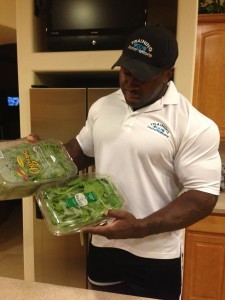Organic vs. Non Organic: Is One Better Than The Other?
Organic vs. Non Organic: Is One Better Than The Other?
 As my personal training clients begin their journey toward better health and fitness they often have questions about their diets. One of the most common questions I am asked concerning their diet is “Should I buy organic or non-organic food?” In order to make this decision it’s important to understand the difference between organic foods and non-organic foods.
As my personal training clients begin their journey toward better health and fitness they often have questions about their diets. One of the most common questions I am asked concerning their diet is “Should I buy organic or non-organic food?” In order to make this decision it’s important to understand the difference between organic foods and non-organic foods.
Organic food is produce that is grown without pesticides and chemical fertilizers. It is also meat and dairy that comes from animals that are given organic feed, are not given antibiotics and hormones and are allowed to graze outdoors. Conventional, or non-organic food, is food that is grown following a standard U.S. model. Produce can be sprayed with certain pesticides, fungicides or herbicides. It is usually grown in large quantities to provide the lowest possible cost. Animals raised for meat or dairy in a conventional food system may not have access to pastures or grazing.
People who buy organic food often cite reasons such as organic food is safer and healthier to eat but this is largely debated. Studies have shown that there is no evidence of organic food being healthier than conventional food and both provide the same nutritional value. Organic meat was found to contain less antibiotic resistant bacteria but the type of bacteria that causes food poisoning was equally present in both organic and non-organic meat. As far as chemical treatments are concerned, washing conventional produce removes significant amounts of chemicals and is shown to be safe for consumption. Whether produce was organic or non-organic, it should be washed either way to avoid bacteria that can exist on the surface.
The biggest difference between the two is the cost with organic food being more expensive. Organic food is more expensive because it is labor intensive to grow. Organic fertilizers also cost more than synthetic fertilizers which raises the prices of organic food.
When considering what types of food to incorporate into your diet, organic is not always better than conventional food. Instead of focusing on an organic vs. non-organic label, select foods that occur in their most natural state such as fresh produce, whole grains, and lean meats while avoiding processed foods that provide little or no nutritional value.
To learn more about organic vs. non organic foods, making better nutritional choices, living a healthier lifestyle, or if you’ve been thinking about hiring a personal trainer, contact us.

